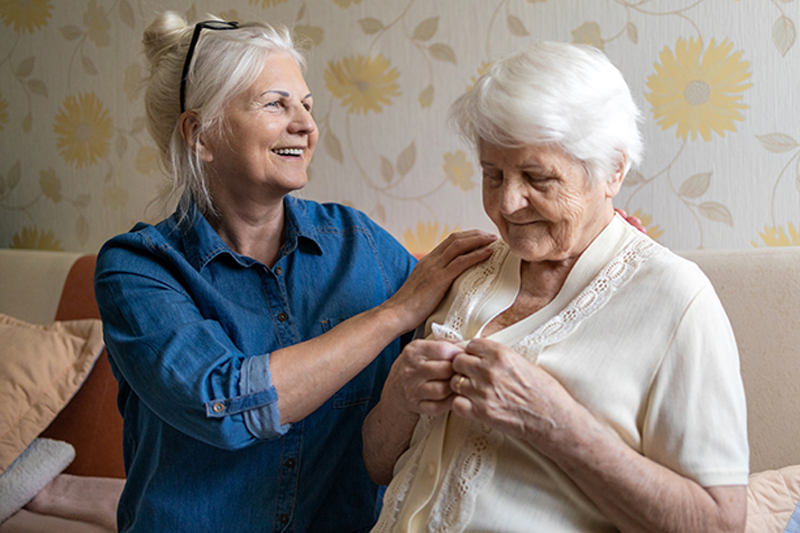
The early characteristics of middle stage Alzheimer’s may be subtle.
Receiving the news that an older family member has been diagnosed with Alzheimer’s is life-altering. Thinking through the many different facets and factors associated with the disease as well as its impact, both presently and in the future, can be overwhelming.
In this three-part series, we will examine the early, middle and later stages of dementia. We’ll explore the type of care needed during each stage, what family caregivers can expect, and how Live Free Home Health Care, one of the most trusted senior care companies in Concord, NH and nearby areas, can help. Contact us online or call 603-217-0149 today to schedule a free in-home assessment and learn how our Alzheimer’s caregivers can help.
Characteristics of Middle Stage Alzheimer’s: What Caregivers Can Expect
The characteristics of middle stage Alzheimer’s may be subtle, and may even be unnoticeable at first. Eventually, a loved one in this stage will start to experience ever-increasing difficulty with daily tasks, such as getting dressed. It is essential for family caregivers to continue to foster a feeling of autonomy, allowing the senior loved one to accomplish these tasks at his / her own pace as long as possible (and as long as it’s safe to do so). This requires patience, flexibility, and adaptability.
It will become necessary to invest additional time in providing care, and to establish creative techniques and ways to lessen frustration – for the senior and for yourself. Self-care becomes very important in the middle stage of dementia in order to help caregivers manage stress.
Here is what you may expect to experience during this stage:
Behavior Changes
- Anxiety
- Irritability
- Depression
- Repetitive behaviors
- Aggressive outbursts (physical and/or verbal)
Tips on How to Help
Maintaining a relaxed attitude is critical. Do not disagree or try to reason with someone in the middle stage of dementia. In a calm and soothing tone, recognize the feeling behind the behavior and give recommendations that can help. For example: “Mom, I see you’re feeling annoyed about misplacing your favorite blouse. It is probably in the washing machine. This violet one looks pretty on you; do you want to wear it today?”
Take into account that the words and actions being conveyed are not a reflection of you personally, but simply part of the common progression of dementia. In many cases, there is an underlying emotion, such as exhaustion, fear, or hunger, driving the behavior. Try to identify the main cause and address that.
Communication Changes
- Losing train of thought
- Forgetting a word or phrase
- Repeating statements or questions
- The use of more non-verbal communication
Tips on How to Help
Accept whatever type of communication is effective for the older adult, without trying to correct her or him. Alter your communication technique to make it easier for the senior to understand and respond to you. For example, as opposed to asking open-ended questions (“What would you like for dinner today?”) offer a choice between just two options (“Would you like chicken or salmon for dinner today?”). Speak in a clear, soothing tone, and allow your loved one ample time to reply without jumping in and providing the answer yourself.
Safety-Related Changes
- Wandering
- Driving concerns
- Sundowning
In this stage of the disease, paying closer attention to safety issues becomes very important. Driving should stop – something that’s usually challenging for older adults to accept. If at all possible, include the senior loved one in making this decision. If not, a note from the physician prohibiting driving is often the best way to gain his or her consent. In the event the older adult is insistent about continuing to drive, you might have to stow away the keys, or exchange his or her set of keys with nonworking ones.
Additionally, sundowning and wandering become alarming and hard for family caregivers to manage independently. Partnering with a trusted care provider with experience in dementia care, like Live Free Home Health Care, is a perfect solution. Our caregivers can take the night shift, ensuring seniors are safe and distracted with enjoyable activities when struggling to sleep – allowing family caregivers to get the rest they require.
For more information about our specialized in-home Alzheimer’s and dementia care, email or call Live Free Home Health Care, one of the most trusted senior care companies in Concord, NH and nearby areas, any time at 603-217-0149.
